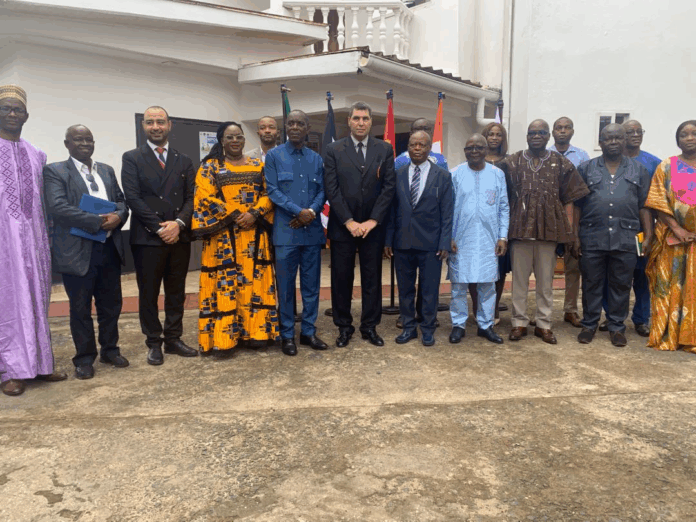By SKS
The Mano River Union (MRU) marked its 52nd anniversary with a bold vision to serve as a model of regional integration, aligning itself with the African Continental Trade framework and continuing to act as a facilitator of peace, trade, economic development, and environmental sustainability.
The commemorative event was held at the MRU Secretariat on Spur Loop, Wilberforce, Freetown, on Friday, October 10, 2025.
In his address, Secretary General Simeon M. B. Moriba highlighted the union’s origins, recalling that MRU was established by the founding fathers, President Siaka P. Stevens of Sierra Leone and President William Tolbert of Liberia, with the aim of removing trade barriers, fostering economic growth, and promoting regional unity for the benefit of their peoples.
He acknowledged the challenges faced by the union following the civil wars in Sierra Leone and Liberia but emphasized the union’s strategic plan, which now focuses on pressing issues such as climate change, youth employment, and cross-border investments. Moriba stated, “These strategic plans are not just commitments—they are a clarion call for member states to fully cooperate, especially in honoring their financial obligations. Despite these hurdles, there is hope for the future of the MRU.”
He assured the audience that, moving forward, the union remains committed to maintaining peace, advancing economic development, and prioritizing the welfare of its citizens: “We will ensure peace is maintained, economic progress is pursued, and the well-being of our people remains at the forefront of our efforts.”
Deputy Secretary General Ama Gborie Foday provided an overview of the union’s history and objectives, recalling that the founding vision was rooted in the belief that the peoples of the MRU are one. She emphasized that the union’s initial mandate was to eliminate barriers and promote economic activities among member states, and that in 1980, its scope was expanded to include financial monitoring, energy, and infrastructure development, among others.
Madam Foday also noted that the MRU is governed by Heads of State, with a technical commission and secretariat responsible for implementing policies. Unfortunately, she pointed out that these technical institutions established over the years are no longer operational.
She revealed plans to re-engage partners to revive initiatives such as the re-establishment of Air Mano, a proposed regional airline.
Fasineh B. Kamara, Senior Transport Engineer at the African Development Bank (ADB)—a key partner—affirmed the bank’s commitment to supporting the MRU’s vision, including the Air Mano project and the construction of a peace bridge between Guinea and Sierra Leone.
Kamara further mentioned ongoing discussions regarding the Yenga border issue and reaffirmed the ADB’s focus on promoting economic and social development, institutional strengthening, climate resilience, youth employment, and drug control through targeted programs and activities.
Looking ahead, the Deputy Secretary General expressed the union’s ambition to establish its own headquarters building, aiming to become a model of regional integration aligned with the African Continental Trade Agenda, while also prioritizing environmental sustainability and border security.
At the event, ECOWAS Ambassador to Sierra Leone, John Azumah, reflected on the significance of the occasion, emphasizing that MRU remains a vital framework for cross-border solidarity in West Africa. “MRU embodies the spirit of togetherness that ECOWAS admires and supports,” he stated, reaffirming ECOWAS’s commitment to working collaboratively with the union.
Safea Ndomaina, Deputy Secretary at the Ministry of Planning and Economic Development, underscored the importance of continued collaboration among member states. He called for deeper regional integration and sustainable development, emphasizing that the MRU is a crucial platform for shared progress and solutions.
Representatives from development partners, including the Embassy of the Kingdom of Morocco and the International Organization for Migration (IOM), also reaffirmed their commitments to supporting the union’s ongoing initiatives.
As the MRU celebrates over five decades of regional cooperation, this milestone underscores its unwavering dedication to fostering peace, economic growth, and environmental resilience across the Mano River basin.


